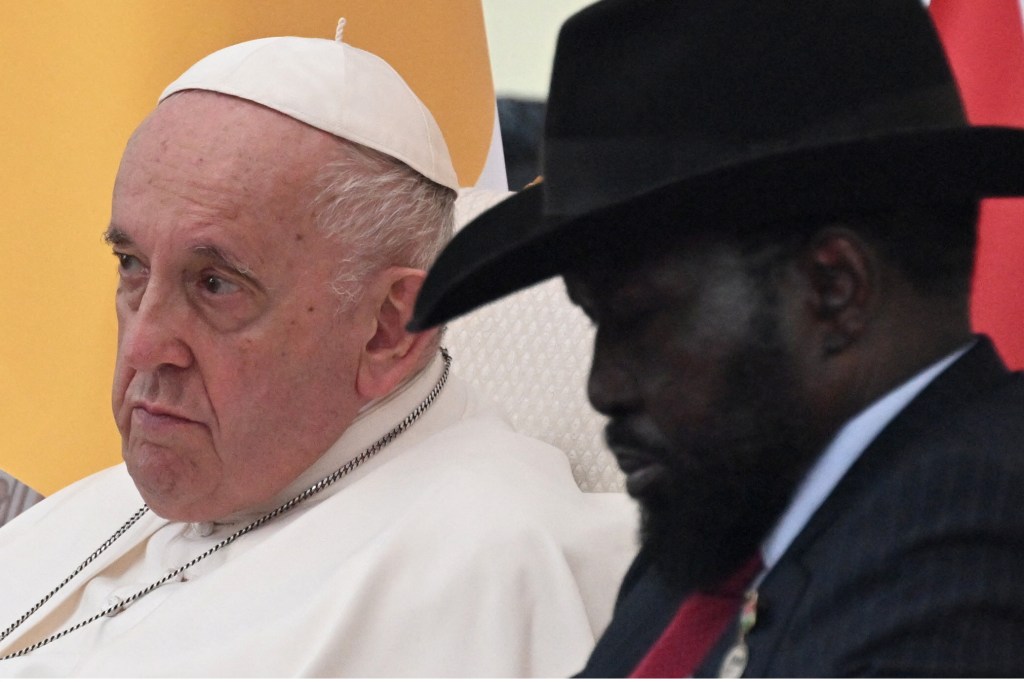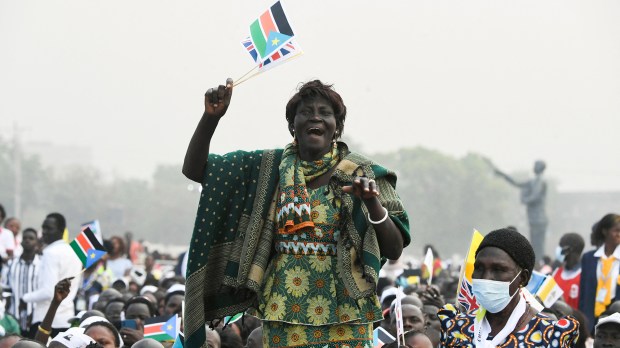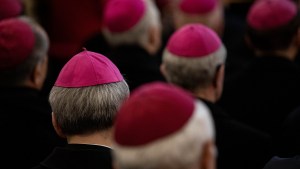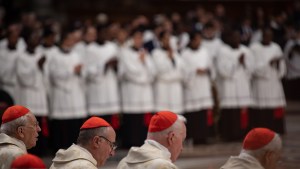At the Angelus on July 9, 2023, Pope Francis announced the creation of 21 cardinals, 18 of whom will be electors, at a consistory to be held on September 30. Among them are 3 African cardinals: Archbishop Stephen Brislin, 66, of Cape Town (South Africa), Archbishop Stephen Ameyu Martin Mulla, 59, of Juba (South Sudan), and Archbishop Protase Rugambwa, 63, coadjutor of the Diocese of Tabora (Tanzania).
These three future cardinals bring the number of African cardinal electors to 19 in the event of a conclave, i.e. almost 14% of the college of electors. There were only 11 at the 2013 conclave, or 9.6%.
This notable increase also corresponds to the evolution of the number of Catholics in Africa, who represent 19.3% of Catholics worldwide (according to Vatican statistics for the year 2021).
This new group of cardinals slightly strengthens the weight of Africa in a college that continues to internationalize. For the first time, a cardinal will be created for South Sudan, a country that gained independence only in 2011. While Tanzania still had a cardinal elector and will now have two, South Africa has not had one for two years.
Archbishop Stephen Brislin of Cape Town (South Africa)
Archbishop Stephen Brislin, who turns 67 on September 24, will give South Africa back its seat among the cardinal electors. Cardinal Wilfrid Fox Napier, Archbishop Emeritus of Durban and a dynamic spokesman for the conservative sector of the Church in the media and on social networks, reached the age of 80 on March 8, 2021.
Stephen Brislin, from a family of Scottish and Irish descent, studied in Pretoria, London, and Louvain. He was ordained a priest in 1983 for the Diocese of Kroonstad, in the center of the country. Benedict XVI appointed him bishop of this diocese in 2006, then Archbishop of Cape Town in 2009. Archbishop Brislin was also president of the South African Bishops’ Conference from 2013 to 2019. The low-profile archbishop said he was “confused and bewildered” by the announcement of his cardinalate, but pledged to represent the whole of southern Africa faithfully and loyally in the College of Cardinals.
Although South Africa is considered one of the rising political and economic powers of the African continent, its Catholicism remains very much in the minority. Animist traditions and the various Protestant denominations are in the majority, as a consequence of Dutch and English colonization. According to statistics from the Pontifical Yearbook, the Diocese of Cape Town has only 5% Catholics served by 66 diocesan priests, a modest figure for a city of almost five million inhabitants.
Archbishop Stephen Ameyu Martin Mulla, a strong choice for a country in tatters
Of the list of 21 cardinals created by Pope Francis, the Archbishop of Juba (South Sudan) Stephen Ameyu Martin Mulla is undoubtedly the one most in line with the “peripheral” appointments dear to Pope Francis, for two reasons.
The first is that South Sudan is one of the world’s poorest countries. The Argentine Pontiff visited this young, English-speaking, predominantly Christian country in East Africa last February — a first for a pope. The nation was born out of two successive wars of independence that resulted in the deaths of two million people and the exile of four million. In choosing Archbishop Stephen Ameyu Martin Mulla, 59, the Pope is giving a voice to this region of Africa where tribal violence still reigns.
It was no doubt also to condemn the scourge of tribalism that Pope Francis decided to confer the cardinal’s biretta on this prelate, ordained a priest in 1991. His appointment as Archbishop of Juba in 2019 was met with an outcry from people of the diocese, some of whom went so far as to write to Rome to contest the choice and spread rumors about him. The unofficial reason for this rebellion: Stephen Ameyu Martin Mulla does not belong to the majority tribe in the Juba region. A Vatican investigation confirmed the papal appointment.
As archbishop of the capital, Stephen Ameyu Martin Mulla welcomed the Pope to his country for a trip dedicated to reconciliation between the two Christian politicians at the head of the country, President Salva Kiir and his opponent Riek Machar.

Last April, when a deadly conflict broke out in neighboring Sudan, the future cardinal asked South Sudanese Christians to open their doors to welcome refugees.
Archbishop Protase Rugambwa, a Tanzanian familiar with the Roman Curia
Archbishop Protase Rugambwa, 63, is one of three African cardinals to join the College of Cardinals. His appointment is a sign of the esteem in which the Pope holds him, having just sent him back to his country after 10 years of service in the Holy See. By receiving the cardinal’s purple, he will become Tanzania’s second cardinal elector, alongside 78-year-old Cardinal Polycarp Pengo.
Born on May 31, 1960, in Bunena, Tanzania, Protase Rugambwa was ordained a priest on September 2, 1990, for the Diocese of Rulenge. After obtaining a doctorate in pastoral theology from the Pontifical Lateran University in Rome, he worked in what was then the Congregation for the Evangelization of Peoples — now the Dicastery for Evangelization.
On January 18, 2008, he was appointed Bishop of the Diocese of Kigoma, Tanzania. He was recalled to Rome on June 26, 2012, when Benedict XVI appointed him deputy secretary of the Congregation for the Evangelization of Peoples and president of the Pontifical Mission Societies. On November 9, 2017, Pope Francis confirmed him as Secretary of the Congregation.
During his years of service, the archbishop distinguished himself in particular for his defense of African youth faced with the challenges of migration. In a report in July 2022, he urged members of the Association of Regional Episcopal Conferences of Central Africa (ACERAC) to “to help the youth of Central Africa not to waste, but rather to shape an identity that values their origins, their culture and their religiosity in the encounter with new cultural and religious schemes and models.”
At the end of his mandate in the Curia, the Argentine Pontiff appointed him coadjutor bishop of the Diocese of Tabora on April 13, 2023. He then returned to his country to assist the incumbent archbishop, Paul Runangaza Ruzoka — who had just passed the age limit — with the right of succession.
The Cardinal-designate will thus represent in Rome an East African country marked by a certain religious pluralism, with around 50% Christians (more than half of whom are Catholics) and 35% Muslims, as well as animist communities and Hindu and Sikh minorities, given the presence of Indian traders. The local Catholic Church is relatively well-developed, with 34 dioceses.



